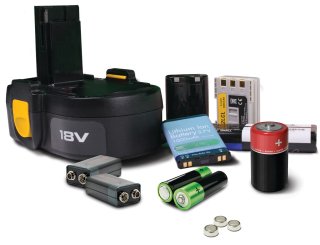

When batteries are discarded improperly, such as in household trash or curbside recycling, critical materials inside batteries are lost and cannot be recycled into new batteries. Batteries can also start fires throughout the municipal waste management system, causing air pollution issues in already overburdened communities and threatening worker and first responder safety.
The Bipartisan Infrastructure Law requires EPA to develop battery collection best practices and battery labeling guidelines. Congress allocated $10 million and $15 million respectively to the Agency to complete these tasks by September 30, 2026.
In June and July 2022, EPA conducted widespread outreach to learn about the current state of battery recycling and labeling efforts around the United States. EPA hosted a series of virtual feedback sessions and issued a request for information to seek input on all battery chemistries (e.g., lithium-based and nickel-metal hydride) and all battery types (e.g., small format primary or single-use and rechargeable batteries; mid-format; large format vehicle batteries, including electric vehicles; and industrial batteries used in manufacturing, commercial businesses, and healthcare operations). More than 780 unique participants attended the feedback sessions, and 59 people and organizations submitted responses to the RFI.
EPA is currently developing a Report to Congress on the best practices for collection of batteries to be recycled that will be published in 2024. This report will identify existing best practices, describe the current state of battery collection, and lay out EPA’s next steps. After the publication of this report, EPA will seek to capture and share new and innovative best practices to complement the report.
Throughout 2024, EPA will host a series of working sessions to inform the development of best practices for state, Tribal, and local governments to collect end-of-life batteries for recycling. As specified in the BIL, the best practices must:
EPA aims to develop collection best practices that cover a wide array of small, medium (or mid-), and large format battery chemistries (lithium-ion, nickel-cadmium, etc.) and uses (consumer products, e-scooters, electric vehicles, industrial storage). The collection best practices will identify best practices for communication and outreach, collection locations, transportation, measuring progress, and other important elements.
The final product of these working sessions will be a best practices toolkit that features guidance, tools, templates, and training materials for state, Tribal, and local governments to use when implementing battery collection and recycling programs. The collection best practices toolkit will be finalized in 2026.
There will be a series of meetings focused on collection of small format consumer electric and portable batteries and battery-containing products. Conversations about collection related to mid-format and large format batteries used in vehicles, energy storage, and industrial setting will be combined with discussions about labeling.
Throughout 2024, EPA will host a series of working sessions across the battery life cycle to inform the development of voluntary guidelines for battery labeling. These labeling guidelines will be designed to improve battery collection by:
The final product of these working sessions will be a set of voluntary labeling guidelines for various battery chemistries and types. The voluntary labeling guidelines will be published by 2026.
There will be a series of meetings focused on labeling of small format consumer electric and portable batteries and battery-containing products. Conversations about labeling related to mid-format and large batteries used in vehicles, energy storage, and industrial settings will be combined with discussions about collection best practices.
The working sessions for developing battery collection best practices and voluntary labeling guidelines will have distinct but related conversation tracks, organized by battery type, in 2024–2025. Each track will include a series of working sessions. While participation will vary between each track, there may be individuals or organizations that can contribute to more than one. These conversation tracks are illustrated and described in more detail below. Each of these tracks will take place simultaneously starting in March 2024. The number and frequency of the working sessions may vary by battery type.
What is the battery type?
The collection best practices and labeling guidelines working sessions will gather input from interested parties. These sessions will include broader discussions associated with small format consumer electric and portable batteries along with more focused conversations related to mid-format and large format batteries for mobility, vehicles, energy storage, and industrial uses.
Current Policies, Practices, and Trends
September 12, 2024
2:00 - 4:00 PM Eastern Time
Role of Manufacturers and Retailers in Promoting Safer Collection and Recycling
October 15, 2024
2:00 - 4:00 PM Eastern Time
Consumers Information Needs and Safety Concerns
October 30, 2024
2:00 - 4:00 PM Eastern Time
Ensuring Safe End-of-Life-Management
| Topic | Date |
|---|---|
| Kick-off: Current Landscape and Conversation Track Overview for All Battery Types | March 19, 2024 |
| Track 1b: Small Format Batteries - Collection Systems and Locations | April 11, 2024 |
| Track 1a and 1b: Small Format Batteries - Labeling and Collection: Tribal Waste Management Webinar | May 2, 2024 |
| Track 1b: Small Format Batteries - Safe Collection, Storage, and Transport | May 14, 2024 |
| Track 1a: Small Format Batteries – In-person Working Session on Battery Labeling | June 12-14, 2024 |
| Track 1b: Small Format Batteries - Collection Education and Outreach | June 20, 2024 |
| Track 1a: Small format batteries - Report Out from In-Person Labeling Intensive and Additional Input | July 16, 2024 |
The collection best practices and labeling guidelines working sessions will gather input from interested parties. These sessions will include broader discussions associated with small format consumer electric and portable batteries along with more focused conversations related to mid-format and large format batteries for mobility, vehicles, energy storage, and industrial uses. If you are interested in participating in all or some of these meetings, please provide your information on this web form.